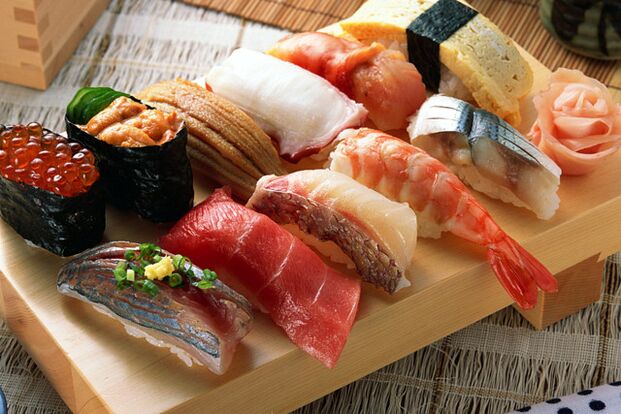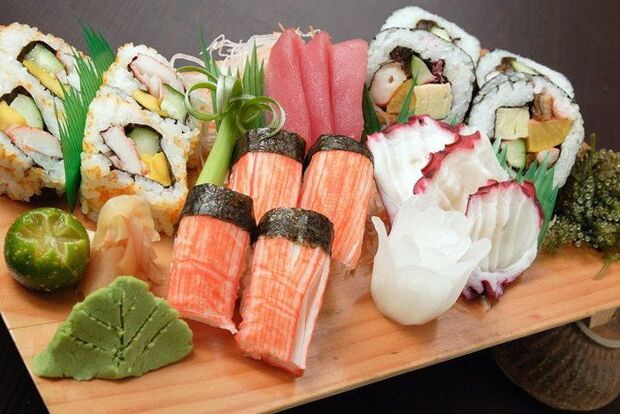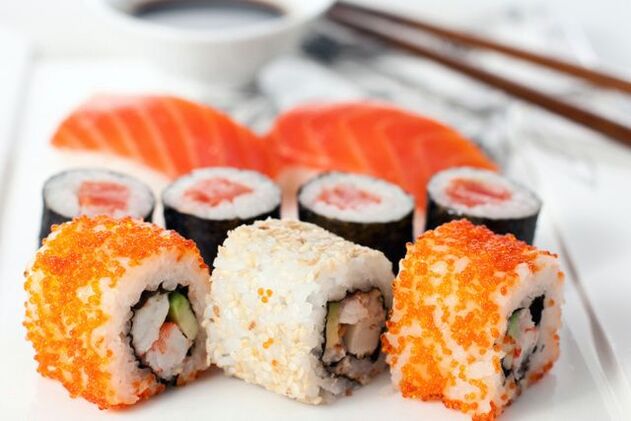
The Japanese diet is considered one of the most effective and popular modern diets.
Why? Because in a fairly short period of time - 14 days, you can lose 7 to 11 pounds of extra pounds.
Such a rapid effect can be explained by the fact that the Japanese diet is unbalanced, that is, it was compiled without taking into account the proportions of fat, protein and carbohydrates. In addition, the menu of the Japanese diet is low in carbohydrates and low in calories, which makes the body burn its own layers of fat.
The main goal of the Japanese diet is to change the rhythm of metabolic processes in the body so that you can maximize your weight loss within 2-3 years.
The essence of Japanese food
The essence of the Japanese diet is foods with increased protein content provided by foods that are allowed in the diet: meat, fish, dairy products.
The Japanese diet is considered quite strict due to the strict restrictions on the menu. During the Japanese diet, you cannot eat:
- Salt;
- seasoning;
- sugar and confectionery;
- Alcohol.
However, if you are accustomed to drinking only coffee for breakfast and prefer meat and fish in your food, the Japanese diet may not seem that difficult for you. Additionally, one of the advantages of this diet is that fermented dairy products, fruits, and vegetables are allowed in the diet.
There is no limit to fluid intake in the Japanese diet - drink as much as you can during the day, but not less than 1. 5 liters per day. You can drink mineral water, tea or pure water.
14 Days of Japanese Diet has several menu options that do not differ much from each other in product composition. However, if you choose an option, you shouldn't "jump" to another option if the first option suddenly doesn't work for you for some reason.
14 Days of Japanese Diet Menu

Strictly observe the menu shown in the table below:
| breakfast | dinner | dinner | |
|---|---|---|---|
| Day 1 | a cup of coffee | 2 hard boiled eggs, vegetable oil coleslaw, 1 cup tomato juice. | Boiled or fried fish (200g) |
| Day 2 | coffee, 1 biscuit (cookie) | 100g boiled or fried fish, coleslaw (with vegetable oil). | Boiled beef (100g), 1 cup kefir. |
| Day 3 | Coffee, biscuits (biscuits) | Fried Zucchini (200g) | 2 hard boiled eggs, 200g boiled beef, coleslaw. |
| Day 4 | coffee | raw eggs, 3 grated raw carrots and vegetable oil, 20g parmesan cheese | fruit |
| Day 5 | Grated carrots seasoned with lemon. | boiled or fried fish (200g), 1 cup tomato juice | fruit |
| Day 6 | a cup of coffee | ½ boiled chicken, carrot and cabbage salad | 2 hard-boiled eggs, grated carrots seasoned with vegetable oil |
| Day 7 | green tea | boiled beef (200g), fruit | Any dinner from the previous days (except the third day! ) |
| Day 8 | green tea | ½ boiled chicken, carrot and cabbage salad | 2 hard boiled eggs, cabbage and carrot salad |
| Day 9 | coffee | 200g boiled or fried fish, 1 cup tomato juice | any fruit |
| Day 10 | coffee | 1 egg (raw), 3 grated carrots and vegetable oil, 20g parmesan cheese | fruit |
| Day 11 | coffee, 2 unsweetened cookies | Vegetable Fried Zucchini (200g) | 2 eggs (poached), 200g boiled beef, coleslaw |
| Day 12 | coffee (2 dry cookies) | Boiled or fried fish (200 g), carrot or cabbage salad | 200g boiled beef, 1 cup kefir |
| Day 13 | coffee | 2 hard boiled eggs, carrot coleslaw, 1 cup tomato juice | Boiled or fried fish (200g) |
| Day 14 | coffee | Fried or boiled fish (200g), carrot coleslaw | 200g boiled beef, 1 cup kefir |
Diet Plans and Rules in Japan

1. Consult a doctor
- First, the Japanese diet dictates regular consumption of black coffee, which may be contraindicated for people with cardiovascular disease, low blood pressure, and high blood pressure. Your doctor may recommend using green tea instead of black coffee.
- Second, high amounts of protein can overtax the kidneys, which can lead to weakness and decreased energy, headaches, and an acetone taste in the mouth.
Japanese food taboos:
- nursing mothers and children;
- During physical exertion and hard work.
2. Prepare to diet
Before eating, it is necessary to schedule a fasting day: it is recommended to drink 2-3 glasses of kefir or milk at dinner, instead of breakfast and lunch - a small amount of buckwheat or rice and a fresh vegetable salad.
3. Foods on a diet
- Coffee used in the diet should be natural as it contains antioxidants that support the body.
- It is recommended to cook meat and fish in a double boiler or fry them in a small amount of oil.
- Olive oil is recommended for dressing vegetable salads.
4. Vitamins
A low-calorie diet does not provide the body with the necessary substances, therefore, a vitamin-mineral complex must be taken at that time.
5. Quit the diet
You can't schedule a "stomach holiday" about quitting the diet and swooping on food.
The calorie content of the diet should be gradually increased: salt, starch and sweets should be added little by little.
The main rules of the Japanese diet:
- Watch your diet exactly every day, don't confuse the number of days.
- Only use products listed on the menu.
- Drink 1. 5 liters of fluids per day.
- Do not continue eating for more than 14 days.
14 Day Japanese Diet Review
1. Doctor Reviews
The Japanese diet is considered to be very strict, so first you need to have a mental attitude to prevent neurasthenia during the eating process. The body is stressed by low-calorie foods, so temporary metabolic disturbances and "food breakdown" may occur.
2. Other comments
Initial comment: From my own experience, I would say that the Japanese diet is unbearable. Especially in the early days. But the result was negative 9kg. 4 months have passed and the weight has not come back, however, I am keeping fit with the help of fitness.
Second trial: the most difficult first 4 days. There was even dizziness. But it turned out to be a 100% return. Lose 10kg! Yes, the body is well cleaned during this time.
3rd Review: Benefits - Delicious product without choking on kefir or buckwheat. Cons - Early weakness, hungry feeling. The result is negative 7kg.
As you can see, the effectiveness of dieting has been proven in practice, however, when starting a diet, the main thing is to focus all your will on your fists and try not to let it go.





















